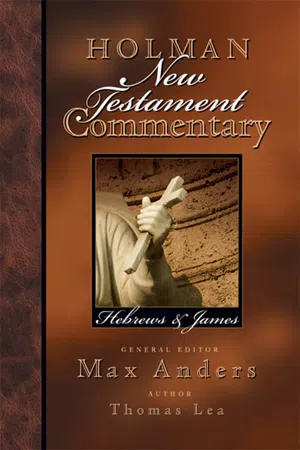
- 400 pages
- English
- ePUB (mobile friendly)
- Available on iOS & Android
eBook - ePub
Holman New Testament Commentary - Hebrews & James
About this book
One in a series of twelve New Testament verse-by-verse commentary books edited by Max Anders. Includes discussion starters, teaching plan, and more. Great for lay teachers and pastors alike.
Trusted by 375,005 students
Access to over 1 million titles for a fair monthly price.
Study more efficiently using our study tools.
Information
Introduction to
Hebrews

The book is anonymous. We find no name for a stated author. Best suggestion for authorship is that given by Origen, Christian leader in the third century, who said, “But as to who actually wrote the epistle, God knows the truth of the matter.”
Eastern Christianity viewed Paul as the author, even though those who supported Pauline authorship knew that the language did not resemble Paul's other letters. Western Christianity did not accept Pauline authorship until the fourth century. They felt that the letter had great authority, but many saw it as anonymous and non-Pauline.
The writer of Hebrews held to the same basic apostolic teaching as Paul, but he wrote with a different style and quoted the Old Testament differently from the apostle.
Among possible authors suggested are Luke, Apollos (see Acts 18:24), Barnabas, Priscilla, and Aquila.
The author identified himself as a second-generation Christian (see Heb. 2:3), and he wrote with an excellent literary style and a vivid vocabulary.
The original readers of the book knew the writer's name, for he asked for prayers that he might be able to visit them (13:18–19) and expressed the hope that Timothy would come with him (13:23).
ORIGINAL READERS OF HEBREWS
The title “To the Hebrews,” though not original, can be traced back to the last quarter of the second century. The readers of this book were familiar with the Old Testament and knew the ritual of the Book of Leviticus and the details of the tabernacle. The intended audience was probably Jewish believers with a similar background to those Jews who wrote the Dead Sea Scrolls. They were not eyewitnesses to Jesus, but they had learned of him from those who were (Heb. 2:3–4).
They had faced persecution and endured abuse, imprisonment, and loss of property for their faith, but not martyrdom (Heb. 10:32–39; 12:4). They demonstrated their faith by serving fellow believers and particularly supported those who endured persecution (Heb. 6:10; 10:34).
They had ceased to grow as Christians and were falling away from the commitment they had known (Heb. 5:11–6:12). The writer rebuked them for not meeting together often enough (10:24–25). They were in danger of lapsing into sin (3:12–14).
The readers of Hebrews may have been in danger of returning to Judaism in order to avoid persecution. The author warned them against such apostasy (6:4–9; 10:26–31) and urged them to return to the mainstream of Christian fellowship.
Knowing where the intended audience lived is difficult to determine. Among locations suggested are Jerusalem, Alexandria, and Rome, with the latter being the best possibility.
DATE
Mention of Timothy in 13:23 suggests a date in his lifetime, some time in the first century. Their failure to suffer martyrdom (Heb. 12:4) rules out the Jerusalem church (see Acts 7:54–60) and suggests a date before Nero's persecution (A.D. 64). Rome was the intended destination.
The author wrote as if the Jerusalem Temple were still standing. The description of the ritual in 9:6–9 contains many usages of the Greek present tense, suggesting events still underway.
Mention of sacrifices in 10:2 implied that they were still being offered. Best suggestion is a date just before Nero's persecutions in A.D. 64.
CHARACTERISTICS OF HEBREWS
The Greek style of Hebrews is elegant and highly literary. It is one of the most difficult New Testament writings to translate from the Greek. The book also contains many Old Testament quotations and allusions. Most of the quotations were from the Greek version of the Old Testament—the Septuagint. Many of these references were taken from the Psalms, particularly Psalm 110:1,4.
The writer used the Old Testament sacrificial system as a background for the explanation of the superiority of the redemptive work of Jesus Christ.
The references to the person of Christ (Christology) are many and varied. There are more than twenty names and titles for Jesus (Son, Lord, High Priest, apostle, author and finisher of our faith, etc.). Although there is clear reference to the deity of Christ, the humanity of Christ is emphasized more than in most New Testament writings (Heb. 4:14–16).
Throughout Hebrews a series of warnings appear. These are injected into the argument of the epistle. The warnings urge the readers not to neglect salvation in Christ (2:1–4; 3:7–4:13; 5:11–6:20; 10:26–39; 12:15–29).
The form of Hebrews is unlike that of the typical Pauline letter of the New Testament. There are few personal references and greetings (cf. 6:9–10; 12:4). Some have suggested that Hebrews was an exhortation or sermon given to a specific congregation.
Hebrews 1

God's Son: Supreme over Prophets and Angels
I. INTRODUCTION
The Surprising Presidency of George Washington
II. COMMENTARY
A verse-by-verse explanation of the chapter.
III. CONCLUSION
Portraits of Jesus
An overview of the principles and applications from the chapter.
IV. LIFE APPLICATION
Jesus Will Not Be Moved
Melding the chapter to life.
V. PRAYER
Tying the chapter to life with God.
VI. DEEPER DISCOVERIES
Historical, geographical, and grammatical enrichment of the commentary.
VII. TEACHING OUTLINE
Suggested step-by-step group study of the chapter.
VIII. ISSUES FOR DISCUSSION
Zeroing the chapter in on daily life.


“Millions of angels are at God's command
and at our service. The hosts of heaven
stand at attention as we make our way from
earth to glory, and Satan's BB guns are no
match for God's heavy artillery.”
and at our service. The hosts of heaven
stand at attention as we make our way from
earth to glory, and Satan's BB guns are no
match for God's heavy artillery.”
Billy Graham

Hebrews 1 shows that Jesus is superior to the prophets and to angels. God had spoken fully through his Son but only partially and imperfectly through the prophets. Jesus is superior to angels because he is God's Son, while angels are created spirits sent by God to minister to believers. As God's Son, Jesus is his heir, cocreator, and coruler of the universe, exercising authority over creation and over his enemies.
God's Son: Supreme over
Prophets and Angels
I. INTRODUCTION
The Surprising Presidency of George Washington
Even though today we call him the “Father of our Country,” some of his contemporaries did not think that highly of George Washington. Washington's father died when he was eleven. He had almost no formal education because his family could not afford the expense of school in an era without public education. He never visited Europe. John Adams tersely remarked that Washington was “too illiterate, unlearned, unread for his station and reputation.” He developed his mind through his own reading program.
This “unlearned” aristocrat surprised the country. He burst into the spotlight of leadership by commanding a frontier militia at twenty-one years of age. He delivered an ultimatum to French forces pushing into English lands in the Ohio Valley.
He was also a peacemaker. The followers of the brilliant politicians, Alexander Hamilton and Thomas Jefferson, often hotly debated their contrasting political views. With great skill and patience Washington brought unity and moderation to these unmanageable followers.
He had moral convictions. He provided freedom for his slaves after his wife's death and guaranteed their support in his will. In the 1830s these freedmen were still receiving payments from his estate.
He was unselfish. When Congress offered him command of the Continental armies, he refused a salary. He accepted only reimbursement for expenses. He made the same suggestion when he became President. Congress refused his suggestion and set the President's salary at $25,000, a large amount in those days.
Washington showed wisdom in what he expected for the country. He did not aim at power and expansion but at independence. In his farewell address he expressed the hope that the country would have the time “to settle and mature its yet recent institutions and to progress without interruption to that degree of strength and consistency which is necessary to give it, humanly speaking, the command of its own fortunes.”
Many Americans did not expect greatness from President George Washington. His success surprised and impressed his critics.
Hebrews addresses readers who reverenced the Old Testament...
Table of contents
- Front Cover
- Half Title
- Full Title
- Copyright
- Dedication
- Table of Contents
- Editorial Preface
- Contributors
- Commentary
- Introduction 1
- Hebrews 1
- Hebrews 2
- Hebrews 3
- Hebrews 4
- Hebrews 5
- Hebrews 6
- Hebrews 7
- Hebrews 8
- Hebrews 9
- Hebrews 10
- Hebrews 11
- Hebrews 12
- Hebrews 13
- Introduction 2
- James 1
- James 2
- James 3
- James 4
- James 5
- Glossary
- Bibliography 1
- Bibliography 2
Frequently asked questions
Yes, you can cancel anytime from the Subscription tab in your account settings on the Perlego website. Your subscription will stay active until the end of your current billing period. Learn how to cancel your subscription
No, books cannot be downloaded as external files, such as PDFs, for use outside of Perlego. However, you can download books within the Perlego app for offline reading on mobile or tablet. Learn how to download books offline
Perlego offers two plans: Essential and Complete
- Essential is ideal for learners and professionals who enjoy exploring a wide range of subjects. Access the Essential Library with 800,000+ trusted titles and best-sellers across business, personal growth, and the humanities. Includes unlimited reading time and Standard Read Aloud voice.
- Complete: Perfect for advanced learners and researchers needing full, unrestricted access. Unlock 1.4M+ books across hundreds of subjects, including academic and specialized titles. The Complete Plan also includes advanced features like Premium Read Aloud and Research Assistant.
We are an online textbook subscription service, where you can get access to an entire online library for less than the price of a single book per month. With over 1 million books across 990+ topics, we’ve got you covered! Learn about our mission
Look out for the read-aloud symbol on your next book to see if you can listen to it. The read-aloud tool reads text aloud for you, highlighting the text as it is being read. You can pause it, speed it up and slow it down. Learn more about Read Aloud
Yes! You can use the Perlego app on both iOS and Android devices to read anytime, anywhere — even offline. Perfect for commutes or when you’re on the go.
Please note we cannot support devices running on iOS 13 and Android 7 or earlier. Learn more about using the app
Please note we cannot support devices running on iOS 13 and Android 7 or earlier. Learn more about using the app
Yes, you can access Holman New Testament Commentary - Hebrews & James by Thomas Lea, Max Anders in PDF and/or ePUB format, as well as other popular books in Theology & Religion & Biblical Commentary. We have over one million books available in our catalogue for you to explore.